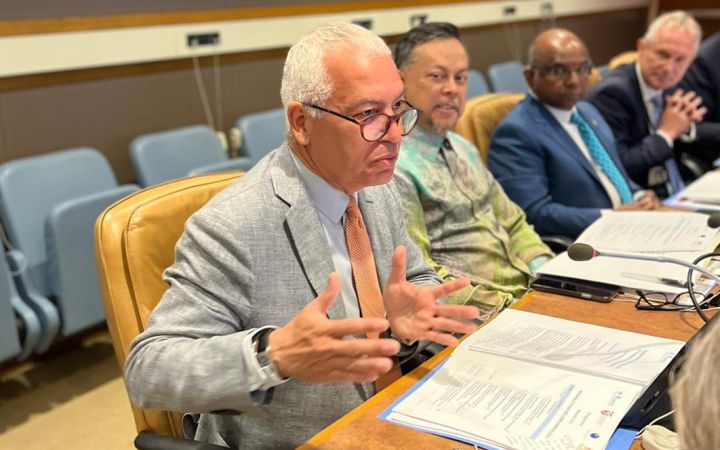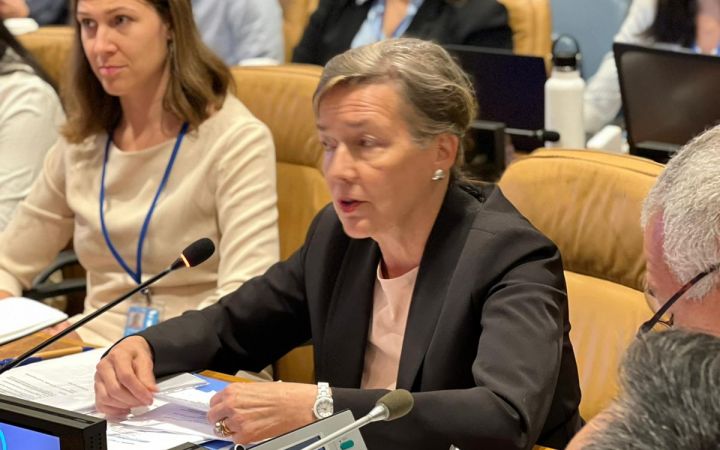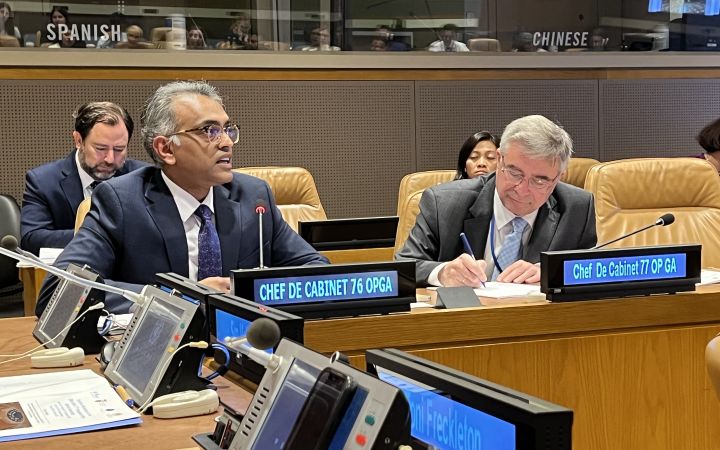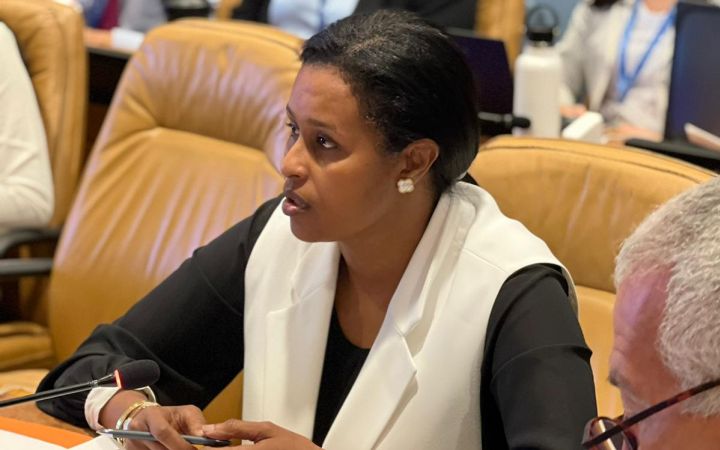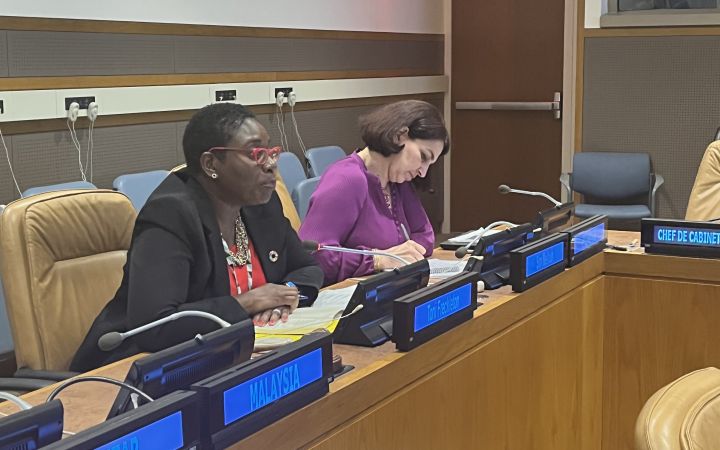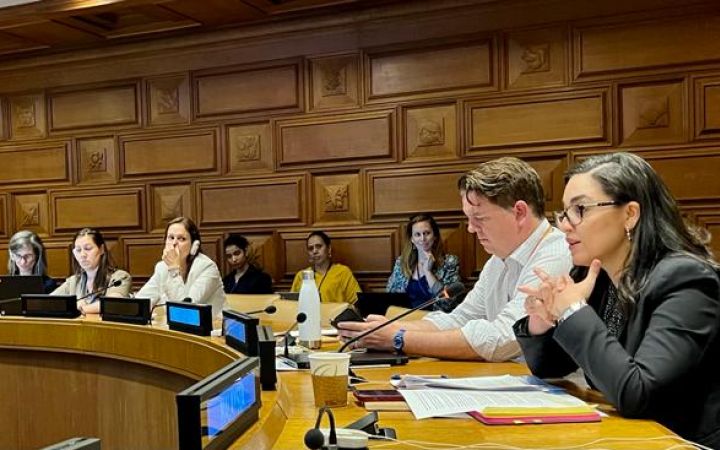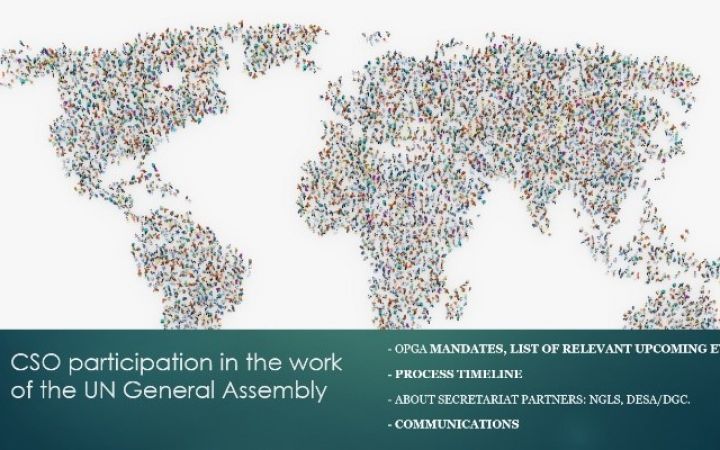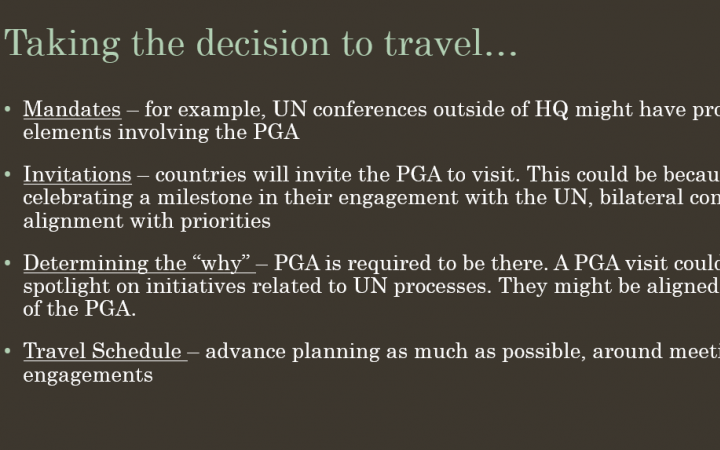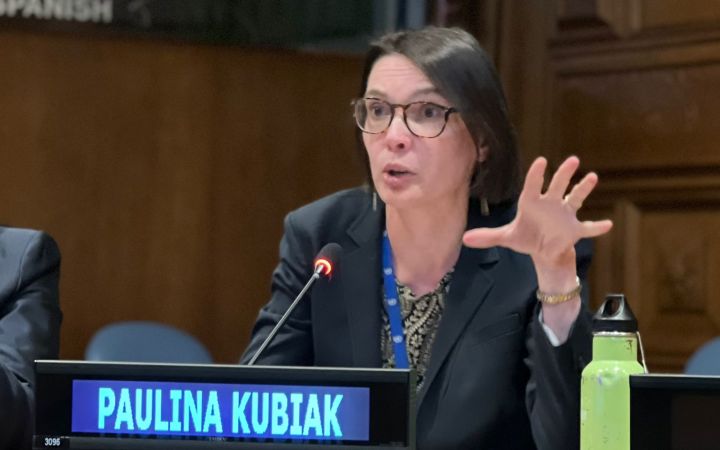New York, USA - UNITAR office in New York together with the Permanent Missions of Ecuador, Finland, and Malaysia held the "Transition Workshop" to support the incoming team of the office of the President of the General Assembly. The initiative pretends to be a permanent feature of the annual UNITAR calendar to back this critical transition.
For two days, UNITAR facilitated opportunities for existing, former, and incoming staff of the President of the General Assembly to collaborate, share best practices, and make connections to ensure that existing institutional knowledge is adequately and accurately transferred to support the work of the new President of the GA, particularly between officials and operational level of the incoming and outgoing team.
The three Permanent Representatives of the sponsoring Missions, Ecuador, Finland, and Malaysia, H.E. Mr. Cristian Espinosa, H.E. Ms. Elina Kalkku, and H.E. Mr. Syed Mohamad Hasrin Aidid, respectively, opened the workshop and introduced the keynote participants H.E. Abdulla Shahid President of the 76th GA and H.E. Csaba Kőrösi President-elect of the 77th GA. Mr. Marco Suazo, Head of the UNITAR NYO moderated the sessions during the two days of the workshop. The Permanent Representative of Malaysia, H.E. Mr. Syed Mohamad Hasrin Aidid, highlighted how successful was the first transition workshop last year. The co-organizers received encouraging feedback including from the wider Member States. He added that the transition workshop was also recognized and welcomed by all Member States through the General Assembly resolution 75/325, which was adopted by consensus on 10 September 2021.
H.E. Mr. Shahid and Mr. Kőrösi delivered remarks regarding the emphasis on supporting the office of the President of the GA and its functioning together with the Member States, civil society, and most importantly science. They both agreed that there are always high expectations on the team of the PGA and this year, transformation, will be the crucial objective the new team wants to follow.
Sendai Framework, Paris Agreement, Addis Ababa, and Common Agenda were mentioned during the intervention of the PGA-elect. All of them look in the same direction in which solutions may come through solidarity. H.E. Mr. Kőrösi also briefly explained that the UN may originate pragmatic solutions and integrate systems with the role of science. At the end of his intervention, the PGA-elect thanked his team for their visions which pull everyone; their vision is no less than the vision of the organization. Experience is a hard teacher, he emphasized.
The head of the UNITAR office in New York, Mr. Marco Suazo, addressed the 76th President acknowledging the big legacy he leaves and how important is to follow it. He reminded participants of the workshop that it is not a lecture exercise but an interactive session to solve queries and build experiences. The workshop aims to build better exchange exercises and facilitate institutional memory for the incoming team.
During her intervention, the Permanent Representative of Finland, H.E. Ms. Elina Kalkku, emphasized that her country supports multilateralism and one of her priorities is to support this transition the best they can. She briefed about the annual retreat organized by Finland for Permanent Representatives and the confidential environment around it. However, she shared those questions like "Why does the UN exist?" were on the table. The important answer was what the UN delivers. It was also underlined that the Member States need to cross regional borders, but also mental borders. There is a vision for strategy and important decisions. The role of this transition workshop is precisely to support continuity, and institutional memory. Many important things including gender, youth, stakeholders, and leadership were mentioned by the Ambassador of Finland.
H.E. Mr. Nagaraj Kakanur, Chef de Cabinet of the 76th Office of the PGA, opened his module on "Experiences, Advice, and Best Practices" and after a brief introduction on drafting concept notes for various events. He suggested participants ensure documents are understandable for the reader and that they may have clear roles within the office. For the Chef de Cabinet, the next year will be a very intensive time in the office and asked participants to remember that office is their second home. He also recommended keeping in mind suggestions from the speechwriter who may come with a lot of details. "What was your best experience so far with the team and the office?" was one of the questions addressed to the Chef de Cabinet during the Q&A section.
Ms. Saada Hassan, Deputy Chef de Cabinet of the 76th OPGA, conducted the session on "Peace and Security" and described the structure peace and security, and the learning and reading process to improve in the field. She highlighted that the team was divided by areas of work depending on their different expertise. She has a big role in preparing notes for briefings, bilateral, and inputs for other requests. Her team was in charge of working with the Department of General Assembly and Conference Management (DGACM) to implement mandates and how put in place an event. Ms. Hassan added that topics around "Peace and Security" will start working just after the high-level week. She reminded participants that they started sending letters and invitations on time and working closely with Member States on events the PGA was organizing. The dialogue continued and Ms. Hassan recommended being careful with sensitivity and discretion. Since they are not fully experts, they had support from DGACM in preparing logistic aspects. She reflected that assisting the Member States will be also required to have some resources for some cases as the team will never know when the PGA will be needed or the circumstances around. Reflecting on working with other branches within the Organization, Ms. Hassan said that when the PGA needs to travel, the Department of Political Affairs will come with inputs and views on a specific situation. They also worked with Security Council Affairs Division (SCAD) on Security Council coordination ensuring diplomacy was maintained and also the safety and protocol. Coordination meetings with the SC branch will take place every month, for that, Ms. Hassan suggested collecting information from teams, and have schedules and agendas ready. A lot of retro alimentations from the Secretariat will happen. Duplication of interactions can happen, but effectiveness is key and solving issues is essential. Informal discussion to close gaps is welcome, reflected Ms. Hassan.
The moderator passed the floor to Ms. Toni-Shae Freckleton, Team Leader on Sustainable Development of the 73rd and 75th OPGA, who recommended having a focal point and a substitute (minimum of two people covering files). There will be issues during the sessions in which considerations for meetings and briefings with the Member States will take place. She encouraged delegates to keep an eye on working as a team and having clear processes. Usually, facts checking is important and so PGA's statements must be revised ensuring there are no conflicts in quotes. Be as creative as possible, Ms. Freckleton suggested. She also considered that OPGA should get more voices from civil society and also voices of female leaders into discussions. Many of you are from Permanent Missions but building good relations at the delegates level is critical for consensus, she mentioned. The indicator of success in organizing a high-level week will depend on the number of ministers, heads of governments, and presidents attending which may reflect key initiatives, PGA advocacy and strategy priorities. Ms. Freckleton followed with highlights of the team's need to prepare statements for the PGA for the Second Committee and for several meetings in which they may understand the audience very well. The PGA will engage with many people and his message will be different when he engages with the public, interested groups, civil society, youth, etc.
The moderator then welcomed Ms. Sim Mellouh, Team Leader for Human Rights of the 76th OPGA. She touched on a sensitive example of when a human trafficker survivor gave a gift to the office of the PGA. Her team had led significant achievements in commemorating special occasions. Overall, they organized ten meetings, some of them not mandated so they were informal meetings. Her team was in charge also of organizing joint statements with the president of the Human Rights Council, UNESCO to name a few. She also added that adequate synergies with UN Geneva are crucial. The civil society component was essential for the OPGA and teamwork to improve but also progress on best practices and friendly relations. The facilitator and participants engaged in a dialogue on how the world is looked at now as never before and so is the UN. In addition, she shared that engaging with the Secretariat is crucial and it will be necessary to interact with more than one depending on the topics. She recalled working with several delegations to put forward resolutions and there are so many delegates can do in the OPGA to amplify existing mandates. For delegates coming from Permanent Missions, the national perspective is different as now they are wearing the hat of 193 Member States. As part of the dialogue, Ms. Mellouh mentioned three major things not to do like do not assume that OPGA has all the answers as they also need to consult with DGACM; the UN has a number of Secretariats so look for them too and ask for advice; and finally, draw on different perspectives to inform the Chef de Cabinet properly.
Day Two of the Transition Workshop
The programme continued on day two and the moderator, Mr. Marco Suazo, Head of the UNITAR NYO, started the session by giving the floor to the Permanent Representative of El Salvador, H.E. Ms. Egriselda López, who is also the co-chair of the Ad Hoc Working Group on the Revitalization of the General Assembly. H.E. López thanked UNITAR for providing this learning opportunity for the incoming team and gave examples of her experience as co-chair. She reflected that the process has a direct impact on the work of the OPGA. Her comments were timely, and she also added that is imperative to sit down and listen to each other to find ways to revitalize the GA, "not only delivering statements but to actually implement and move forward", she emphasized. She reminded participants of the voluntary pledge of limiting side events and the challenge of raising awareness to have a concrete outcome, not speaking for the sake of speaking. Ambassador López quoted the PGA-elect on streamlining the agenda of the GA and they both understood how difficult it is to implement process sometimes. She also highlighted that assigning focal points to follow the discussions of different bureaus to have good coordination with the Secretariat to implement and support the mandates is vital. She underscored the importance of handout reports for the upcoming PGA office to give them guidance on how to make their work more manageable.
The following speaker Mr. Peter Stone, Deputy Team Leader of the Reform, Legal and Budget Team, covered the financial and budget aspects. Drawing on his experience, he pointed out that the team of the OPGA is pretty much part of the Secretariat once they are in office because the financial and budget implications depend on the UN. The OPGA works for the Member States and financial regulations and procurement apply to them as well. For a simple quotation, come with 3 proposals, he recalled. If the team considers buying something, have the right conversations internally first before speaking to people. One thing on finances to be reminded like anyone authorizing spending money in the office of the PGA should go first to the Chef de Cabinet to have the proper authorization. He also shared the necessity of linking with the GA Branch to get information on schedules, procedures, commemorative days, and more.
Preparations for General Assembly high-level events and insights on work materials were delivered by Ms. Inga Kanchaveli, Deputy Team Leader of the 76th OPGA. She elaborated on the number of high-level meetings (18) to organize throughout the year plus additional commemorative events. For annual reports, different organs are involved while the negotiation process may continue through the whole year. She noted that as OPGA members, delegates must have a clear picture of the proponents and partners as informal meetings are different from special events. She suggested keeping the same title of every mandate during meetings and related events. In order to organize special commemorative meetings, she suggested knowing how previous events were organized in the past and recalled that the PGA has the mandate to finalize arrangements. Everything that happens in 2023 will be organized by the office of the PGA, she added. Ms. Kanchaveli spoke about the certain language to use which the legal team should have the chance to see in advance and be careful with silence procedures. Elaborating on the PGA Handover Report, she invited delegates to not only reflect on the event itself but its significance. Getting what is relevant, challenges, and recommendations to be shared with upcoming delegations were suggested. Related to the bigger picture of the work of the OPGA, Ms. Kanchaveli closed her presentation by talking about Revitalization, Security Council, UN Reform, and Consultations.
The next facilitator, Ms. Mariyam Naeem, talked about "Travel Preparation". She elaborated on mandates for meetings of the PGA happening outside, the importance of clarity on the procedures of conferences themselves, and annual invitations. How to take a decision for traveling overseas for bilateral or conferences, well, first keep in mind that there is no choice for some of them because there are mandates and some of them are a unique opportunity. Ms. Naeem suggested planning the schedule in advance the much as possible as there are also procedures to follow. For travel preparations, a programme must be done in close consultation with the host, get good sources of information, suggestions, and liaison with officers who can support on what to avoid, what to do, decide on PGA priorities, and have a clear instruction on who the PGA wants to engage as young people, NGOs, for example.
In the final part of the programme, Ms. Paulina Kubiak addressed "Media, Communications, and Outreach". She provided information on websites dedicated to events, digital and print publications, the use of booklets, and media interaction. She also referred to the importance of communicating and knowing the team of global communication from the Secretariat. As Ms. Kubiak said, they are the people with resources in place. During the Q&A section, a participant addressed a question on how delegates can make all this information tangible for people and how they transform the way of operating.
Ms. Kubiak answered that the legal team always has the tools, however, the OPGA may face different situations where is important to remind what is the main objective. About formats of special events and initiatives, always be transparent with the Member States, she suggested. To conclude her session, Ms. Kubiak answered about what can be wrong or possible scenarios, for that, it is vital to have a checking list in hand.
Next on the programme to deliver the concluding notes was the Chef de Cabinet designate H.E. Mr. Lázló Szőke who thanked the organizers and participants for the great event organized. He appreciated the initiative to have two days of the workshop, for the organization and implementation. He reflected on how informative, reflective, and helpful, with many discussions on a lot of topics discussions was the sessions. For him, the workshop was very enjoyable with a special combination of effective elements on what is formal and informal. Messages on theoretical, practical, and most particularly the messages of encouragement, and warning, were remembered by him. The job will be basically to see the big picture of everything; however, it is not easy. There is always active scrutiny of the OPGA. The goal of the new team of the OPGA is to maintain expectations but be innovative. They will emerge and will avoid mistakes, he closed.
To conclude the annual transition workshop, the Permanent Representative of Ecuador, H.E. Mr. Cristian Espinosa, highlighted that the initiative assisted to provide advice, focusing on agenda items, and revitalization of the work of the GA. Ambassador Espinosa expressed that the team to make the GA stronger with leadership. He also thanked UNITAR for its leadership and coordination and the panelists for their support and hard work.

